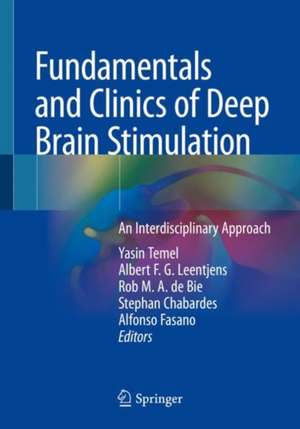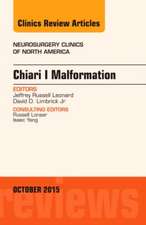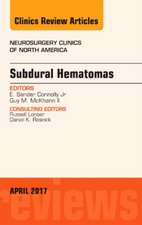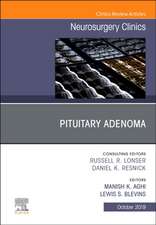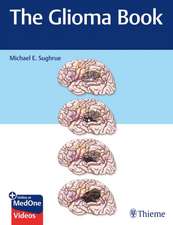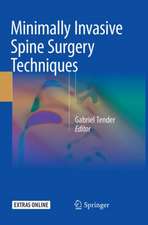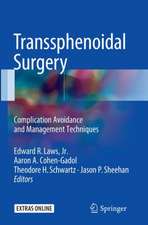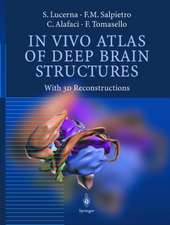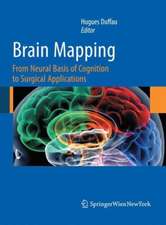Fundamentals and Clinics of Deep Brain Stimulation: An Interdisciplinary Approach
Editat de Yasin Temel, Albert F.G. Leentjens, Rob M.A. de Bie, Stephan Chabardes, Alfonso Fasanoen Limba Engleză Paperback – 25 mar 2021
It starts with a general section, which discusses basic principles and general considerations. This is followed a sections dedicated to neurological disorders, and psychiatric disorders, in which only accepted indications are discussed. All experimental indications are discussed in the final chapter. The text is supplemented with numerous illustrations.
Intended for medical specialists and residents involved in the treatment of patients with DBS, it also appeals to other professionals working with DBS patients, such as psychologists, nurses, physiotherapists, as well as basic and clinical neuroscientists.
| Toate formatele și edițiile | Preț | Express |
|---|---|---|
| Paperback (1) | 610.16 lei 38-44 zile | |
| Springer International Publishing – 25 mar 2021 | 610.16 lei 38-44 zile | |
| Hardback (1) | 880.44 lei 38-44 zile | |
| Springer International Publishing – 25 mar 2020 | 880.44 lei 38-44 zile |
Preț: 610.16 lei
Preț vechi: 642.26 lei
-5% Nou
Puncte Express: 915
Preț estimativ în valută:
116.75€ • 122.23$ • 96.61£
116.75€ • 122.23$ • 96.61£
Carte tipărită la comandă
Livrare economică 02-08 aprilie
Preluare comenzi: 021 569.72.76
Specificații
ISBN-13: 9783030363482
ISBN-10: 3030363481
Pagini: 307
Ilustrații: XII, 307 p. 62 illus., 43 illus. in color.
Dimensiuni: 178 x 254 mm
Greutate: 0.72 kg
Ediția:1st ed. 2020
Editura: Springer International Publishing
Colecția Springer
Locul publicării:Cham, Switzerland
ISBN-10: 3030363481
Pagini: 307
Ilustrații: XII, 307 p. 62 illus., 43 illus. in color.
Dimensiuni: 178 x 254 mm
Greutate: 0.72 kg
Ediția:1st ed. 2020
Editura: Springer International Publishing
Colecția Springer
Locul publicării:Cham, Switzerland
Cuprins
Part I General Section.- 1. The History of Deep Brain Stimulation.- 2. Anatomy of Targets for Deep Brain Stimulation.- 3. Mechanisms of Deep Brain Stimulation.- 4. Surgical and Technical Aspects of Deep Brain Stimulation.- 5. Future Perspectives: Adaptive Deep Brain Stimulation.- 6. Neurophysiology of the Basal Ganglia and Deep Brain Stimulation.- 7. Anaesthesia for Deep Brain Stimulation Surgery.- 8. Programming: General Aspects.- 9. Neuropsychological Assessment.- 10. Ethical Considerations.- 11. Organisation of Care for Patients Treated by Deep Brain Stimulation.- Part II Neurology.- 12. Deep Brain Stimulation for Parkinson’s Disease.- 13. Tremor.- 14. Dystonia.- 15. Epilepsy.- 16. Gilles de la Tourette syndrome.- Part III Psychiatry.- 17. Deep Brain Stimulation in Obsessive-Compulsive Disorder.- 18. Deep Brain Stimulation for Depression.- 19. Other Indications for Deep Brain Stimulation.
Recenzii
“The book provides a wealth of information and can serve as a useful resource for all interested readers. … The text is accompanied by numerous color figures, schematic presentations, neuroradiological images, and photographs, which make the learning easy and exciting.” (Marina Raguž and Darko Chudy, Croatian Medical Journal, Vol. 62, 2021)
Notă biografică
Yasin Temel is a Professor of Neurosurgery of Maastricht University Medical Center, Maastricht, The Netherlands. He is an expert in Deep Brain Stimulation and has published extensively on this topic. He edited the Dutch ‘Handboek diepe hersenstimulatie bij neurologische en psychiatrische aandoeningen’ together with A. F.G. Leentjens and R.M.A. de Bie.
Albert F.G. Leentjens is Professor of Neuropsychiatry at Maastricht University Medical Center, where he is in charge of the psychiatric DBS programme. Together with Y. Temel and R.M.A. de Bie he edited the Dutch DBS handbook: ‘Handboek diepe hersenstimulatie bij neurologische en psychiatrische aandoeningen’.
Prof. dr. Rob M.A. de Bie is the leader of the Movement Disorders group and the Neurodegeneration programme at Amsterdam Neuroscience, University of Amsterdam. His research focuses on improvement of treatment of Parkinson’s disease, including Deep Brain Stimulation, pharmacological treatment, and non-motor symptoms. Prof. de Bie focuses on complex clinical research and he has initiated several large clinical trials.
Pr Stephan Chabardes is professor of neurosurgery at Grenoble Alpes University. He is the head of the functional and stereotactic unit at Grenoble-Alpes university hospital and of the Clinical unit at CLINATEC-CEA LETI. He is member of the executive committee of the ESSFN, member of the board of directors of the WSSFN and President of the Functional and Stereotactic section of the French Neurosurgery society. Pr Chabardes has participated to the publication of more than 160 peer reviewed papers and is currently heading different clinical trials on deep brain stimulation.
Prof Alfonso Fasano is the co-director of the Surgical Program for Movement Disorders at Toronto Western Hospital, staff neurologist at Toronto Western Hospital and at the Sick Children Hospital, Toronto, ON, Canada. He is also a full professor of medicine in the Division of Neurology at the University of Toronto and a clinician investigator at the Krembil Research Institute, also in Toronto, Ontario, Canada. He is member of the CenteR for Advancing Neurotechnological Innovation to Application (CRANIA). His main areas of interest are the treatment of movement disorders with advanced technology (infusion pumps and neuromodulation), pathophysiology, and treatment of tremor and gait disorders.
Albert F.G. Leentjens is Professor of Neuropsychiatry at Maastricht University Medical Center, where he is in charge of the psychiatric DBS programme. Together with Y. Temel and R.M.A. de Bie he edited the Dutch DBS handbook: ‘Handboek diepe hersenstimulatie bij neurologische en psychiatrische aandoeningen’.
Prof. dr. Rob M.A. de Bie is the leader of the Movement Disorders group and the Neurodegeneration programme at Amsterdam Neuroscience, University of Amsterdam. His research focuses on improvement of treatment of Parkinson’s disease, including Deep Brain Stimulation, pharmacological treatment, and non-motor symptoms. Prof. de Bie focuses on complex clinical research and he has initiated several large clinical trials.
Pr Stephan Chabardes is professor of neurosurgery at Grenoble Alpes University. He is the head of the functional and stereotactic unit at Grenoble-Alpes university hospital and of the Clinical unit at CLINATEC-CEA LETI. He is member of the executive committee of the ESSFN, member of the board of directors of the WSSFN and President of the Functional and Stereotactic section of the French Neurosurgery society. Pr Chabardes has participated to the publication of more than 160 peer reviewed papers and is currently heading different clinical trials on deep brain stimulation.
Prof Alfonso Fasano is the co-director of the Surgical Program for Movement Disorders at Toronto Western Hospital, staff neurologist at Toronto Western Hospital and at the Sick Children Hospital, Toronto, ON, Canada. He is also a full professor of medicine in the Division of Neurology at the University of Toronto and a clinician investigator at the Krembil Research Institute, also in Toronto, Ontario, Canada. He is member of the CenteR for Advancing Neurotechnological Innovation to Application (CRANIA). His main areas of interest are the treatment of movement disorders with advanced technology (infusion pumps and neuromodulation), pathophysiology, and treatment of tremor and gait disorders.
Textul de pe ultima copertă
This book deals with a rapidly growing field of medical science: deep brain stimulation (DBS). Influencing deep brain networks by electrical stimulation through implanted electrodes is increasingly applied, and DBS has become a popular treatment for neurological and psychiatric indications. Professionals in the field of DBS are expected to understand classical subjects as disease mechanisms, brain anatomy and function, and clinical symptomatology of the diseases they treat. In addition, they are required to be familiar with specific patient management skills and treatment strategies. A third dimension is hardware and software-related knowledge. Depending on the degree of involvement, professionals need to understand basic or advanced concepts of stimulation protocols. All these aspects of DBS are discussed in this book.
Authors from many different disciplines, from many different countries, have contributed their expertise and personal experience tothis book. Their contributions reflect the multidisciplinary nature of DBS treatment. This book is written for a wide readership that involves many different professionals and disciplines, including neurologists, neurosurgeons, psychiatrists, neurophysiologists, neuroanatomists, psychologists, rehabilitation specialists, nurses, speech therapists, physiotherapists, engineers and other paramedical disciplines.
In our society, where sharing expertise and experience, and global knowledge has become the new standard, patients want the best possible DBS therapy. One prerequisite for this is the presence of a well-integrated and dedicated multidisciplinary team, with up-to-date knowledge of the possibilities of DBS treatment.
Caracteristici
Presents a broad multidisciplinary approach to deep brain stimulation Focuses on different aspects of deep brain stimulation including surgical, neurological, psychiatric, psychosocial, socio-economic, clinical and ethical issues Includes a range of illustrations and tables to support the texts
